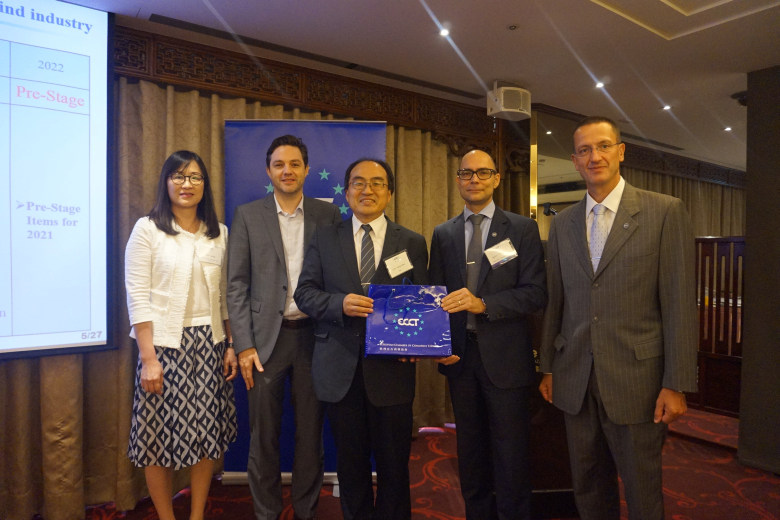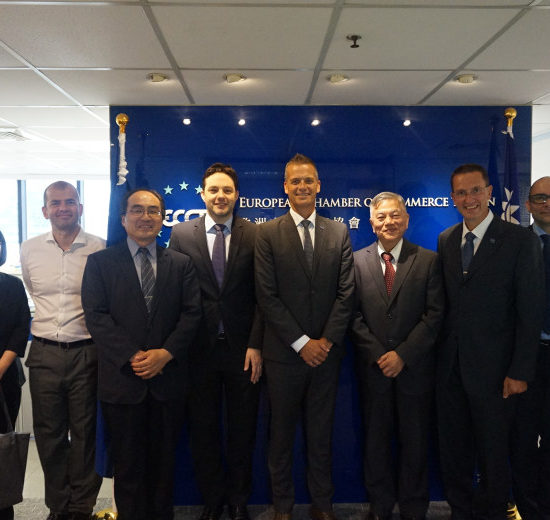Taiwan's industry development policy and promotion status

The ECCT's Wind Energy committee hosted a lunch with guest speaker Leu Jang-hwa, Director-General of the Industrial Development Bureau (IDB), under the Ministry of Economic Affairs (MOEA).
In his presentation Director-General Leu focused on three main topics: 1) Building a local supply chain for the offshore wind industry; 2) Promoting the electric vehicle industry and 3) Plans to promote the smart machinery industry. Leu stressed that the IDB is in charge of driving industrial development in Taiwan and is not involved in drafting legislation, such as Taiwan’s renewable energy legislation, which is the responsibility of the Bureau of Energy (BOE).
One of the IDB’s main objectives is to build a local supply chain for offshore wind energy industry. Leu stressed that IDB has adopted a phased approach and seeks to facilitate international cooperation to promote the development of key subsystems and components and to build an industry supply chain in Taiwan. Part of this initiative is to establish infrastructure and promote the development of industry parks and clusters. In addition, the IDB is encouraging both local and international companies to invest and set up factories in Taiwan. Ultimately the IDB wants to establish Taiwan as a regional hub for the industry to sell into regional markets and enter the international supply chain.
The IDB has set very specific targets aimed at gradually building the local supply chain. By 2021, for example, the target is achieve localisation of tower, foundation and transformer switchgear and switchboard electrical components, as well as construction and supervision of surveying, cable laying, exploration, ship and machine tool planning design and safety management.
The localisation target for 2023 includes a number of wind turbine components, underwater cables and an industrial supply chain for new or retrofitted installation ships (including ships for surveying, support, seabed preparation, transportation and cable laying). The target for 2024 includes the construction and supervision of wind turbines and other parts, ship and machine tool planning design and safety management.
According to DG Leu, the IDB has consulted extensively in the process of developing its plans. On 21 May this year, the IDB and the BOE invited wind farm developers, system suppliers and component manufacturers for a consultation meeting and to introduce the IDB’s plans for the localization and development of the offshore wind industry supply chain. A total of 80 representatives from 39 businesses attended. The IDB will review the industrial programmes proposed by developers (items included in the 2021-2022 grid connection period) at the end of the year. Since late May, the IDB has had 17 meetings with 20 local and international suppliers to brief them on the localization plan, with a view towards facilitating closer cooperation and match-making between local and international suppliers.
Leu went on to talk about how the IDB is promoting the electric vehicle industry in line with its vision to establish a new electric vehicle (EV) industry which focuses on developing critical components and creates a greener environment.
He noted that Taiwan already plays an important part in the global EV supply chain as a producer of many components for EV batteries, motors, bodies, electronic components and chargers. In December 2017 the Executive Yuan announced the Air Pollution Control Action Plan and set a number of targets regarding EVs. All government cars and public vehicles (including buses) will be required to be electric by 2030 while all motorcycles must be electric by 2035 and all other vehicles by 2040.
On plans to promote the smart machinery industry, the IDB’s focus is on the industrialisation of smart machinery (developing solutions for smart machinery, building up a smart machinery industry ecosystem) and moving towards future factories (digitalisation by applying smart machinery solutions). Action plans include building smart machinery capital, upgrading SME’s digital capabilities, integrating industry and research talent, building the smart capacity of benchmark enterprises, enhancing cooperation with Europe, the US and Japan and promoting the new Southbound Policy. Leu noted European companies Siemens and Dassault Systems could lend their expertise in the process.
In a question during the Q&A session on the localisation timetable, Leu admitted that the timetable is very challenging but that all factors had been considered in setting the goals including price, the need for maintaining quality standards and the time expected for the local industry to upgrade capacity and skills. He encouraged European players to work together with local companies to help meet the goals.

